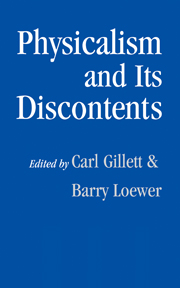Book contents
- Frontmatter
- Contents
- Contributors
- Preface
- Part I Physicalism
- Part II Physicalist Discontents
- 9 The Roots of Reductionism
- 10 The Significance of Emergence
- 11 The Methodological Role of Physicalism: A Minimal Skepticism
- 12 Physicalism, Empiricism, and Positivism
- Part III Physicalism and Consciousness: A Continuing Dialectic
- References
- Index
11 - The Methodological Role of Physicalism: A Minimal Skepticism
Published online by Cambridge University Press: 02 November 2009
- Frontmatter
- Contents
- Contributors
- Preface
- Part I Physicalism
- Part II Physicalist Discontents
- 9 The Roots of Reductionism
- 10 The Significance of Emergence
- 11 The Methodological Role of Physicalism: A Minimal Skepticism
- 12 Physicalism, Empiricism, and Positivism
- Part III Physicalism and Consciousness: A Continuing Dialectic
- References
- Index
Summary
Substantial progress has been made working out the metaphysics underlying physicalism (P) and its idea that everything is, in some sense, physical. But its proponents have not confined themselves to metaphysical claims and have also argued that physicalism has an important methodological role. Hartry Field, Jeffrey Poland, and W.V.O. Quine, among others, all defend what I will call Methodological Physicalism (MP), the position that we should use a Physicalist Criterion under which P is used to assess our theories. Methodological Physicalism exerts considerable philosophical influence. Vindicatory ‘naturalization’ projects, for example, are apparently based upon implicit acceptance of MP. Theories that posit intentional states, moral properties such as goodness and the right, and mathematical entities such as sets and numbers, have all been argued to be in danger of abandonment, and in consequent need of naturalization, because they fail a Physicalist Criterion.
The prescriptions of MP are clearly substantive and an obvious question is how use of a Physicalist Criterion is justified. Any such justification must be compatible with the broadly ‘naturalistic’ orientation of defenders of MP who consequently look to the sciences. For example, Harty Field (1972), and also Jeffrey Poland (1994), both offer what I will call the Justification from Scientific Practice (JSP) to defend their use of a Physicalist Criterion. This justification of MP has as its first premise some version of the normative position that we ought to use in all areas of empirical inquiry the methods that have been successfully used in sciences, and a second, descriptive premise that the Physicalist Criterion has been successfully used to appraise scientific theories in a variety of historical cases.
Information
- Type
- Chapter
- Information
- Physicalism and its Discontents , pp. 225 - 250Publisher: Cambridge University PressPrint publication year: 2001
Accessibility standard: Unknown
Why this information is here
This section outlines the accessibility features of this content - including support for screen readers, full keyboard navigation and high-contrast display options. This may not be relevant for you.Accessibility Information
- 1
- Cited by
